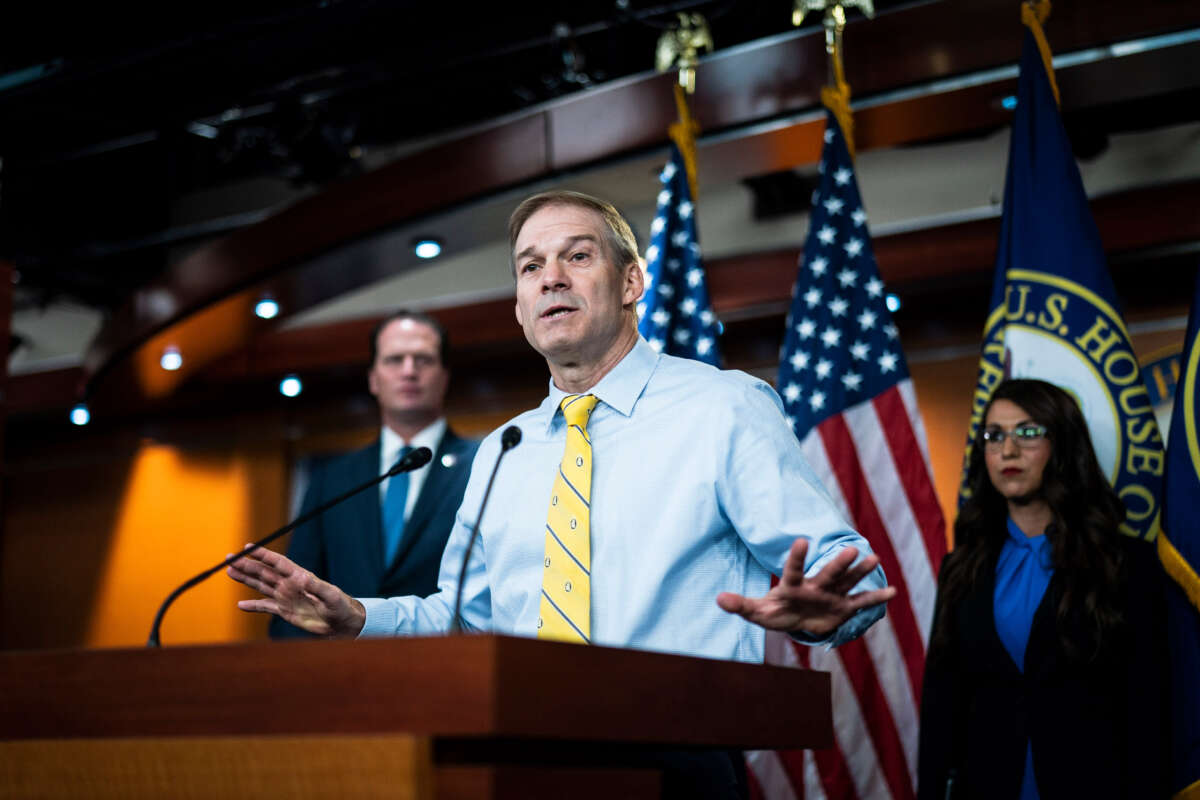Support justice-driven, accurate and transparent news — make a quick donation to Truthout today!
A Twitter account managed by Republican lawmakers who are part of the House Judiciary Committee deleted a tweet praising Kanye West after the rapper praised Adolf Hitler and denied the existence of the Jewish Holocaust during World War II during an interview on Thursday.
The tweet, authored by the House Judiciary Committee Republicans account, was posted on October 6 and was meant to show support for three people — West, who now goes by the mononym Ye; former President Donald Trump; and Twitter owner Elon Musk.
“Kanye. Elon. Trump,” the tweet read.
On Thursday, as Ye was being interviewed by “InfoWars” host Alex Jones about his previous antisemitic comments, the tweet was deleted from the account. So far, the House Judiciary Republicans Twitter account has not addressed why it was taken down, and neither staff for the group nor Jim Jordan (the ranking GOP member of the Judiciary Committee) have commented on the matter.
It’s highly likely that the account deleted the tweet in an attempt to distance the party from Ye’s antisemitic statements during the interview with Jones. However, Ye has made several similar statements between the time the tweet was initially posted and the Jones interview — just days after the Republicans’ tweet, for example, the rapper said that he was going to go “death con 3” on Jewish people. Despite this comment, the tweet remained on the account for weeks.
Focus on Ye’s antisemitic views has increased following the rapper’s meeting with Trump last week at Mar-a-Lago. Unbeknownst to Trump, Ye brought white nationalist and Holocaust denier Nick Fuentes with him to the meeting; afterwards, the former president made the dubious claim that he didn’t know who Fuentes was before that day. (Trump was well aware of Ye’s antisemitic comments at the time of the dinner, however, and has yet to issue a forceful condemnation of Fuentes’s views.)
During Ye’s appearance on “Infowars” on Thursday, he wore a black mask that covered the entirety of his head and repeatedly praised Adolf Hitler, the dictator of Nazi Germany who oversaw the genocide of more than six million Jewish people and countless others.
“I like Hitler,” the rapper said at one point, adding later on in the interview that he “also love[s] Nazis.”
Ye also defended Hitler by claiming that he “invented highways” and that it’s wrong that “you can’t say out loud that this person ever did anything good.” (Hitler did not invent the highway system.)
Ye also denied the existence of the Jewish Holocaust, an indisputable historical event.
“The Holocaust is not what happened, let’s look at the facts of that and Hitler has a lot of redeeming qualities,” he said.
Holocaust denial is a false, antisemitic conspiracy theory that has long been peddled by hate groups seeking to rehabilitate the Nazi regime.
Following the interview, Ye posted a number of antisemitic statements on his newly reinstalled Twitter account, including an image of the Star of David intertwined with a Nazi swastika. Twitter suspended his account on Friday, with Musk stating that Ye “violated our rule against incitement to violence.”
According to a report from NPR, antisemitism in the U.S. has been on the rise in recent years. Data from the Anti-Defamation League (ADL) shows that 2021 was the highest year on record for documented reports of harassment toward Jewish people, including vandalism and direct acts of violence. The organization believes that 2022 will be on par with last year’s findings.
Meanwhile, the GOP has repeatedly platformed right-wing extremists and refused to denounce the antisemitic and white supremacist elements of its base. Candidate Doug Mastriano, who ran for governor as a Christian nationalist in the 2022 midterms, attacked his Democratic opponent Josh Shapiro for sending his children to a Jewish day school, for example.
The increased normalization of antisemitic rhetoric — especially by politicians — sends a dangerous message and could incite violence, many Jewish advocates have warned.
“Donald Trump, a former president, going and meeting with a known white supremacist and Holocaust denier. What does that say to the community? What does that say to the public? It’s a normalization” of antisemitism, said Meredith Weisel, regional director for the D.C. chapter of the Anti-Defamation League, in an interview with the CBC.
Speaking against the authoritarian crackdown
In the midst of a nationwide attack on civil liberties, Truthout urgently needs your help.
Journalism is a critical tool in the fight against Trump and his extremist agenda. The right wing knows this — that’s why they’ve taken over many legacy media publications.
But we won’t let truth be replaced by propaganda. As the Trump administration works to silence dissent, please support nonprofit independent journalism. Truthout is almost entirely funded by individual giving, so a one-time or monthly donation goes a long way. Click below to sustain our work.
